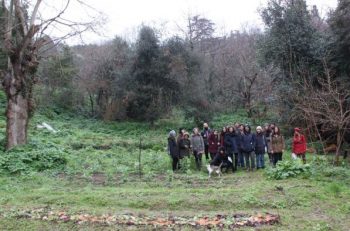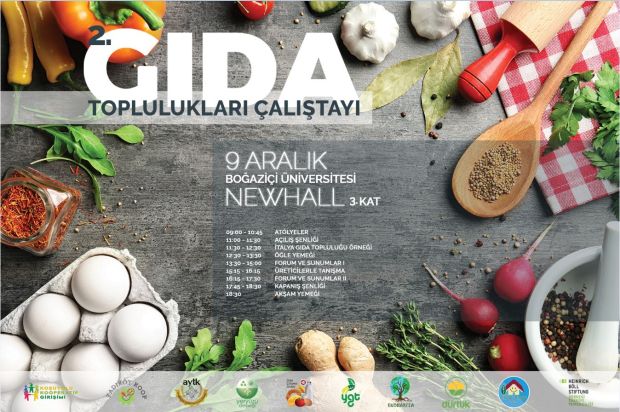‘We Must Promote Local Food Production for Safe Food’
On the second and last part of our file on access to safe food, we host EkoHarita and Association of Ecological Agriculture. Both organizations agree on the importance of local food production to avert the climate crisis and to access safe food for all.
Using ecological agriculture instead of industrial farming methods, and local production instead of high carbon footprint food webs are of immense importance for the continuity of both our planet and the human population. We talked to Alper Can Kılıç, one of the founders of EkoHarita, and Özge Çiçekli, the Secretary General of the Association of Ecological Agriculture, on ways to access safe food. Both Kılıç and Çiçekli emphasize the power of local cooperatives, ecological agriculture, and the importance of raising consumer awareness of organic food.
EkoHarita: We Should Turn Our Food Policy to Local Production
EkoHarita is a project that maps ecological settlements, eco-tourism and camping spots, urban gardens, ecology museums, alternative economy system and all similar ecological initiatives. In addition to these, the site of the project includes a mini social network, a forum, a newspaper, an event calendar, a link bank, and a collection where you can access books/films/documentaries. It is possible to contribute through the Patreon account to ensure the continuity of the EkoHarita project.
One of the founders of EkoHarita, Alper Can Kılıç expresses the purpose of their projects with these words: ‘Basically, we can define the purpose of EkoHarita as “to liberate information and strengthen solidarity”. In this context, we can say that we have provided support to many campaigns, events, workshops, and organizations in terms of communication, as well as providing voluntary service in organizing and filtering a lot of information. We can divide our projects into two as those we conduct and those we are stakeholders in. If we list the works we do, “Topluluk Destekli Tarım Ağı” (Community Supported Agriculture Network) is a project that brings together the formations for food sovereignty and also has the feature of a chronological information bank; “EkoTopluluk” (EkoCommunity) is a software project that we have been working on as we found resources as a tool to facilitate the establishment of food communities, but we have not yet completed; “Doğa Yolun Olsun” (Let Nature Be Your Way) is where we carry out activities on ecological life and permaculture, where we conduct transfers and conversations; “Ekopedi” is an ecological-based wiki study; “Dayanışma Toplulukları ve Ağları” (Solidarity Societies and Networks) is a listing study we started to facilitate access to local support units and solidarity networks for crisis moments during the corona period. We talked about our “Ecology Map” project in the previous paragraph. Apart from this, there are projects and campaigns in which we are involved as stakeholders, such as No Pesticides On My Plate, Pesticide-Free Towns, Ban All Hunting.’
‘The Relationship Between Producer and Consumer Should Be Strengthened’
Kılıç believes that ensuring access to safe food for all is a two-sided task. According to Kılıç, as long as people do not establish food communities, food communities do not multiply and are transformed into structures that communicate, it will not become a structure with social representation. ‘After a while, producers will be able to continue their production, sell their products, get the security and comfort of reaching people with whom they can share the risk, and share experience by establishing relationships with other producers,’ Kılıç said, adding that the improvements in the welfare of the producers will also encourage the producers who make natural production, and that new producers will be encouraged. Kılıç explains that the duty of the consumer is to find manufacturers who produce products that consumers can consume with confidence, and after a while, they develop their communication and establish a trust network by establishing bonds with manufacturers that meet their own criteria through the same trust relationship.
‘The Importance of New Generation Cooperatives in Safe Food’
Kılıç emphasizes the importance of new generation cooperatives in establishing safe food, but he also points out that in the case of Turkey, cooperative formations are very new and it can be tiring to impose too much responsibility: ‘At this stage, we may question the cooperatives directly in this respect, but this is a bit too much for these burgeoning formations. New generation cooperatives continue to develop horizontally and multiply their examples, especially in the last 4-5 years. In this context, it can be tiring to put too much responsibility on these cooperatives until they can stand on their own feet. Most of the volunteers or employees in cooperatives also come from food communities or similar, non-food communities, trying to access food. These people systematize it and turn it into an institutional structure and want to increase its influence. In the system, cooperatives provide ethically based production to the consumers, who can purchase their products at the value/fee they deserve and deliver them to consumers, with only a fair contribution margin, and provide ease of access. When the producer reaches this opportunity, they can continue their production as it is, even by improving its production style and setting an example for the environment. This improves the system. When you go and shop from the cooperative as a consumer, when you establish a food community in your apartment or neighborhood, or when you participate in what is happening, you are supporting this chain. For this reason, we invite everyone to join the food community nearby by browsing our map through our Community Supported Agriculture Network project, and to shop from cooperatives. You can also take a look at the list prepared to find the food communities around you at www.gidatopluluklari.org, the sister project run by the Buğday Association.’
‘We Need to Treat Local Food Movement Much More Seriously Than Hobby Gardening’
Kılıç says that ideally, local consumption is the healthiest and most ecological way, but mega cities do not allow this. Increasing local food opportunities, according to Kılıç, is an issue that needs to be addressed first in the face of all the dangers that await the world, especially the climate crisis: ‘Maybe the increase in urban gardens and orchards in the future will allow us to obtain our food from closer regions and the city periphery. I believe that we should seriously focus on this issue, support it with projects beyond hobby gardening, and local governments should open their eyes on this issue. A pessimistic picture emerges when the agricultural lands in the periphery of the city destroyed by mega projects on the one hand, the city orchards destroyed on the one hand due to the negligence of municipalities and politicians, and the approaching food crisis on the one hand. For this reason, the time has come for us to plant all the seeds we find on even the smallest piece of land we find around us, and to grow our trees and vegetables in the city. As the ÇEKÜL Foundation insistently emphasizes, if we want to have durable cities that can keep us alive in emergencies, we must put this issue at the forefront of our lives as soon as possible. Otherwise, our foreign-dependent food policies may one day be unable to provide food access to a certain segment of the society, we may not be able to overcome crisis situations and other frightening scenarios may be waiting for us.’
Pointing out that ecological agriculture has always been able to meet the world’s food demand, and that it has already met a large part of it, Kılıç said, ‘The basis of the food crisis is not ecological agriculture or low productivity in agriculture, but the food crisis is actually a created crisis. It is a crisis that has been ingrained in our minds by fueling that fear to this day. The poison merchants who do this, those who manipulate the genetics of seeds, and then sell these seeds and poisons together, make the farmer debt and cause cancer are the same people. It is the same mega companies that produce the hospitals they will go to, and the drugs sold in these hospitals. That is why this issue is not just about food, it is about life, and it concerns all of us. If the small farmer disappears, our health is destroyed, our future is destroyed.’
‘Who Will Feed Us?’, published by ETC Group, an independent research organization, compares industrial food to ecological agriculture. Quoting from the booklet: ‘Did you know that the industrial food chain uses more than 75% of agricultural resources to provide food for less than 30% of the world’s population, whereas peasant agriculture uses less than 25% of the world’s population to feed more than 70% of the world’s population? “Who Will Feed Us?” booklet clearly documents that it will be small-scale agroecological production and distribution networks, not corporate farming, and marketing chains, which will ensure our food security, now and in the future, and protect the planet from ecological and social crises.’
The booklet translated into Turkish by Özgürel Başaran, Ceyhan Temürcü and Ayşe Gökçe Bor, together with its visual adaptations. The booklet is available at this link.
Association of Ecological Agriculture: Awareness of Organic Agriculture Should Be Raised
Association of Ecological Agriculture (ETO) was established in İzmir in 1992 with the participation of producers, consumers, processors, traders, controllers, researchers, and technical staff in order to ensure the rapid and healthy development of ecological agriculture under an umbrella organization in Turkey. Since the day it was founded, the association has organized many trainings, seminars, conferences, symposiums, and panels in different fields of ecological agriculture, prepared training materials, conducted many national and international projects or took part as a project partner, especially in sensitive areas, towards the adoption of organic agriculture and capacity building.
ETO Secretary General Özge Çiçekli argues that awareness should be raised in this direction in order to increase the share of organic farming in general agricultural production: During the production of organic products, it should be explained that there is no negative effect on human health and the environment, on the contrary, the products produced with organic agriculture are produced with a transparent, traceable and reliable system. For this, public service announcements should be prepared and broadcast, and projects for primary schools should be made in cooperation with the Ministry of National Education.
‘Inexperience in Organic Farming and Inconsistencies in Support Cause Problems’
According to Çiçekli, there are 19 organic markets in Turkey where organic products are sold. She says, ‘Since the development of the domestic market of organic agriculture will bring a sustainable foreign market, it is important to work on the development of domestic markets and increasing their numbers.’ According to Çiçekli, the biggest problem in the marketing of organic products is conceptual confusion: ‘There are many products that do not have a natural, bioorganic etc. certificate in the market. It is observed that are sold with an organic image and mislead consumers. Consumers are required to request certificates for organic products that they will buy in the open, and on the labels of packaged products, they must look for the organic product logo of the Ministry of Agriculture and Forestry, as well as the logo of the Control and Certification Organizations authorized by the Ministry, and the organization code number.’ Çiçekli counts the problems regarding the organic farming method as the lack of input in plant and animal production, inexperience and the variable support given to organic production, creating a disadvantage for the producers.
‘Environmentally Compatible Food Production is a Must for Less Climate Change’
Çiçekli stated that there may be an increase in the diseases and pests encountered in plant and animal production with the climate crisis. ‘Organic production is the form of production that provides the most support to sustainable life by protecting not only people but also nature. Studies in recent years show that increasing environmentally friendly production methods, improving food safety, and reducing chemical inputs used in agriculture contribute less to climatic changes by reducing energy use. Also, incineration of agricultural wastes with organic production by compost etc. instead of bad practices, ensuring that it mixes with the soil contributes a lot in terms of the environment.’ She underlines the importance of establishing a product strategy related to climate change in our country.
You can find the first part of the file here.





Bizi Takip Edin